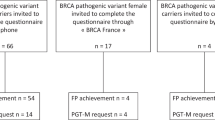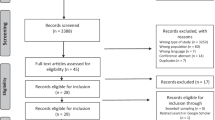Abstract
To describe factors associated with preimplantation genetic diagnosis (PGD) decisions among Jewish Israeli BRCA1/2 carriers or spouses of a male carrier, we contacted all women who initiated PGD consultation for embryonic BRCA1/2 mutation detection at Sheba Medical Center, prior to March 2014. Applying a qualitative approach, we asked women to elaborate on the factors they considered in either opting for PGD or discontinuing the screening procedure. Participants were 18 Jewish Israeli women; 14 were carriers of one of the Ashkenazi founder mutations in BRCA1/2, and four were spouses of male mutation carriers, who underwent at least one cycle of PGD. Prior to seeking PGD, ten of the women had no children. At the time of the interview, all but three had at least one child. Three factors emerged as key motivators for PGD: having witnessed the disease in a close relative (n = 12); prior IVF treatment for infertility (n = 12); and having pre-existing frozen embryos (n = 6). Ten women withdrew from the PGD process due to clinical, logistical, and financial reasons. In conclusion, most women decided to withdraw from PGD instead of continuing until a successful conception was achieved. Those who opted for PGD attributed their discontinuation of further screening to the emotional burden that is greatly intensified by practical difficulties.
Similar content being viewed by others
References
Aarden, E., Van Hoyweghen, I., Vos, R., & Horstman, K. (2009). Providing preimplantation genetic diagnosis in the United Kingdom, the Netherlands and Germany: a comparative in-depth analysis of health-care access. Human Reproduction, 24, 1542–1547.
Akolekar, R., Beta, J., Picciarelli, G., Ogilvie, C., & D'Antonio, F. (2015). Procedure-related risk of miscarriage following amniocentesis and chorionic villus sampling: a systematic review and meta-analysis. Ultrasound in Obstetrics and Gynecology, 45, 16–26.
Anders, C. K., Hsu, D. S., Broadwater, G., Acharya, C. R., Foekens, J. A., Zhang, Y., et al. (2008). Young age at diagnosis correlates with worse prognosis and defines a subset of breast cancers with shared patterns of gene expression. Journal of Clinical Oncology, 26, 3324–3330.
Ao, A., Wells, D., Handyside, A. H., Winston, R. M., & Delhanty, J. D. (1998). Preimplantation genetic diagnosis of inherited cancer: familial adenomatous polyposis coli. Journal of Assisted Reproduction Genetics, 15, 140–144.
Brezina, P. R., Brezina, D. S., & Kearns, W. G. (2012). Preimplantation genetic testing. British Medical Journal, 345, e5908.
Comen, E., Davids, M., Kirchhoff, T., Hudis, C., Offit, K., & Robson, M. (2011). Relative contributions of BRCA1 and BRCA2 mutations to “triple-negative” breast cancer in Ashkenazi women. Breast Cancer Research and Treatment, 129, 185–190.
Derks-Smeets, I. A., Gietel-Habets, J. J., Tibben, A., Tjan-Heijnen, V. C., Meijer-Hoogeveen, M., Geraedts, J. P., et al. (2014). Decision-making on preimplantation genetic diagnosis and prenatal diagnosis: a challenge for couples with hereditary breast and ovarian cancer. Human Reproduction, 29, 1103–1112.
Douma, K. F., Aaronson, N. K., Vasen, H. F., Verhoef, S., Gundy, C. M., & Bleiker, E. M. (2010). Attitudes toward genetic testing in childhood and reproductive decision-making for familial adenomatous polyposis. European Journal of Human Genetics, 18, 186–193.
Drazba, K. T., Kelley, M. A., & Hershberger, P. E. (2014). A qualitative inquiry of the financial concerns of couples opting to use preimplantation genetic diagnosis to prevent the transmission of known genetic disorders. Journal of Genetic Counseling, 23, 202–211.
Eisinger, F., Alby, N., Bremond, A., Dauplat, J., Espié, M., Janiaud, P., et al. (1998). Recommendations for medical management of hereditary breast and ovarian cancer: the French National Ad Hoc Committee. Annals of Oncology, 9, 939–950.
Fortuny, D., Balmana, J., Grana, B., Torres, A., Ramony Cajal, T., Darder, E., et al. (2009). Opinion about reproductive decision making among individuals undergoing BRCA1/2 genetic testing in a multicentre Spanish cohort. Human Reproduction, 24, 1000–1006.
Franklin, S., & Roberts, C. (2006). Born and made: an ethnography of preimplantation genetic diagnosis. Princeton: Princeton University Press.
Handyside, A. H. (2010). Preimplantation genetic diagnosis after 20 years. Reproduction Biomedicine Online, 21, 280–282.
Hartmann, L. C., Degnim, A., & Schaid, D. J. (2004). Prophylactic mastectomy for BRCA1/2 carriers: progress and more questions. Journal of Clinical Oncology, 22, 981–983.
HFEA-Human Fertilization and Embryo Authority. (2006). Authority decision on PGD policy. http://www.hfea.gov.uk/search.html?fldAdvSearchFor=pgd%2C+brca&fldFilter1=on&x=38&y=12#. Accessed 25 Aug 2015.
Hurley, K., Rubin, L. R., Werner-Lin, A., Sagi, M., Kemel, Y., Stern, R., et al. (2012). Incorporating information regarding preimplantation genetic diagnosis into discussions concerning testing and risk management for BRCA1/2 mutations: a qualitative study of patient preferences. Cancer, 118, 6270–6277.
Israel, Ministry of Health Directive (50/2006). (2006). Guidelines for PGD. Ministry of Health: Jerusalem, Israel. http://www.health.gov.il/hozer/mr50_2006.pdf. Accessed 25 Aug 2015, in Hebrew.
Julian-Reynier, C., Chabal, F., Frebourg, T., Lemery, D., Noguès, C., Puech, F., & Stoppa-Lyonnet, D. (2009). Professionals assess the acceptability of preimplantation genetic diagnosis and prenatal diagnosis for managing inherited predisposition to cancer. Journal of Clinical Oncology, 27, 4475–4480.
King, M. C., Marks, J. H., Mandell, J. B., & New York Breast Cancer Study Group. (2003). Breast and ovarian cancer risks due to inherited mutations in BRCA1 and BRCA2. Science, 302, 643–646.
Lincoln, Y. S., & Guba, E. G. (1985). Naturalistic inquiry. Newbury Park: Sage Press.
Menon, U., Harper, J., Sharma, A., Fraser, L., Burnell, M., ElMasry, K., et al. (2007). Views of BRCA gene mutation carriers on preimplantation genetic diagnosis as a reproductive option for hereditary breast and ovarian cancer. Human Reproduction, 22, 1573–1577.
Metcalfe, K., Gershman, S., Lynch, H. T., Ghadirian, P., Tung, N., Kim-Sing, C., et al. (2011). Predictors of contralateral breast cancer in BRCA1 and BRCA2 mutation carriers. British Journal of Cancer, 104, 1384–1392.
Moustakas, C. E. (1994). Phenomenological research methods. Thousand Oaks: Sage Press.
NHS Commissioning Board. (2013). Clinical Commissioning Policy: Pre-implantation Genetic Diagnosis. http://www.england.nhs.uk/wp-content/uploads/2013/04/e01-p-a.pdf. Accessed 25 Aug 2015.
Offit, K., Sagi, M., & Hurley, K. (2006). Preimplantation genetic diagnosis for cancer syndromes: a new challenge for preventive medicine. Journal of American Medical Association, 296, 2727–2730.
Ormondroyd, E., Donnelly, L., Moynihan, C., Savona, C., Bancroft, E., Evans, D. G., et al. (2012). Attitudes to reproductive genetic testing in women who had a positive BRCA test before having children: a qualitative analysis. European Journal of Human Genetics, 20, 4–10.
Quinn, G. P., Vadaparampil, S., Wilson, C., King, L., Choi, J., Miree, C., & Friedman, S. (2009). Attitudes of high-risk women toward preimplantation genetic diagnosis. Fertility and Sterility, 91, 2361–2368.
Quinn, G. P., Vadaparampil, S. T., Tollin, S., Miree, C. A., Murphy, D., Bower, B., & Silva, C. (2010). BRCA carriers’ thoughts on risk management in relation to preimplantation genetic diagnosis and childbearing: when too many choices are just as difficult as none. Fertility and Sterility, 94, 2473–2475.
Quinn, G. P., Pal, T., Murphy, D., Vadaparampil, S. T., & Kumar, A. (2012). High-risk consumers’ perceptions of preimplantation genetic diagnosis for hereditary cancers: a systematic review and meta-analysis. Genetic Medicine, 14, 191–200.
Rapp, R. (1987). Moral pioneers: women, men and fetuses on a frontier of reproductive technology. Women’s Health, 13, 101–116.
Renzetti, C. M., & Lee, R. M. (1993). The problems of researching sensitive topics: an overview and introduction. In C. M. Renzetti & R. M. Lee (Eds.), Researching sensitive topics (pp. 3–13). Newbury Park: Sage Press.
Robertson, J. A. (2003). Extending preimplantation genetic diagnosis: the ethical debate. Ethical issues in new uses of preimplantation genetic diagnosis. Human Reproduction, 18, 465–471.
Robson, M. E., Chappuis, P. O., Satagopan, J., Wong, N., Boyd, J., Goffin, J. R., et al. (2004). A combined analysis of outcome following breast cancer: differences in survival based on BRCA1/BRCA2 mutation status and administration of adjuvant treatment. Breast Cancer Research, 6, R8–R17.
Rubin, L. R., Werner-Lin, A., Sagi, M., Cholst, I., Stern, R., Lilienthal, D., & Hurley, K. (2014). ‘The BRCA clock is ticking!’: negotiating medical concerns and reproductive goals in preimplantation genetic diagnosis. Human Fertility (Cambridge), 17, 159–164.
Sagi, M., Weinberg, N., Eilat, A., Aizenman, E., Werner, M., Girsh, E., et al. (2009). Preimplantation genetic diagnosis for BRCA1/2--a novel clinical experience. Prenatal Diagnosis, 29, 508–513.
Schwartz, G. F., Hughes, K. S., Lynch, H. T., Fabian, C. J., Fentiman, I. S., Robson, M. E., et al. (2009). Proceedings of the international consensus conference on breast cancer risk, genetics, & risk management, April, 2007. Breast Journal, 15, 4–16.
Simchoni, S., Friedman, E., Kaufman, B., Gershoni-Baruch, R., Orr-Urtreger, A., Kedar-Barnes, I., et al. (2006). Familial clustering of site-specific cancer risks associated with BRCA1 and BRCA2 mutations in the Ashkenazi Jewish population. Proceedings of the National Academy of Science U S A, 103, 3770–3774.
Sopik, V., Phelan, C., Cybulski, C., & Narod, S. A. (2015). BRCA1 and BRCA2 mutations and the risk for colorectal cancer. Clinical Genetics, 87, 411–418.
Southey, M. C., Ramus, S. J., Dowty, J. G., Smith, L. D., Tesoriero, A. A., Wong, E. E. M., et al. (2011). Morphological predictors of BRCA1 germline mutations in young women with breast cancer. British Journal of Cancer, 104, 903–909.
Staton, A. D., Kurian, A. W., Cobb, K., Mills, M. A., & Ford, J. M. (2008). Cancer risk reduction and reproductive concerns in female BRCA1/2 mutation carriers. Familial Cancer, 7, 179–186.
Strauss, A., & Corbin, J. (1998). Basics of qualitative research: techniques and procedures for developing grounded theory (2nd ed.). Newbury Park: Sage Press.
Tur-Kaspa, I., Aljadeff, G., Rechitsky, S., Grotjan, H. E., & Verlinsky, Y. (2010). PGD for all cystic fibrosis carrier couples: novel strategy for preventive medicine and cost analysis. Reproduction Biomedicine Online, 21, 186–195.
Vadaparampil, S. T., Quinn, G. P., Knapp, C., Malo, T. L., & Friedman, S. (2009). Factors associated with preimplantation genetic diagnosis acceptance among women concerned about hereditary breast and ovarian cancer. Genetic Medicine, 11, 757–765.
Werner-Lin, A., Rubin, L. R., Doyle, M., Stern, R., Savin, K., Hurley, K., & Sagi, M. (2012). “My funky genetics”: BRCA1/2 mutation carriers’ understanding of genetic inheritance and reproductive merger in the context of new reprogenetic technologies. Family Systems Health, 30, 166–180.
Young, S. R., Pilarski, R. T., Donenberg, T., Shapiro, C., Hammond, L. S., Miller, J., et al. (2009). The prevalence of BRCA1 mutations among young women with triple-negative breast cancer. BMC Cancer, 9, 86.
Acknowledgements
We are grateful to the women who participated in the interviews, for their efforts, for devoting their time, and for their willingness to share their experiences.
Author information
Authors and Affiliations
Corresponding author
Ethics declarations
Conflict of Interest
Efrat Dagan, Daphna Birenbaum-Carmeli, Eitan Friedman and Baruch Feldman declare that they have no conflict of interest.
Human Studies and Informed Consent
The study involved only interviewing human participants.
Each participant signed a written informed consent.
Animal Studies
No animal studies were carried out by the authors for this article.
Funding
This study was funded by the Israel Cancer Association through a grant to Efrat Dagan.
Ethical Approval
The study was approved by the Institutional Review Board at the Sheba Medical Center, Israel, and by the Ethical Committee at the University of Haifa, Israel.
Rights and permissions
About this article
Cite this article
Dagan, E., Birenbaum-Carmeli, D., Friedman, E. et al. Performing and Declining PGD: Accounts of Jewish Israeli Women Who Carry a BRCA1/2 Mutation or Partners of Male Mutation Carriers. J Genet Counsel 26, 1070–1079 (2017). https://doi.org/10.1007/s10897-017-0087-6
Received:
Accepted:
Published:
Issue Date:
DOI: https://doi.org/10.1007/s10897-017-0087-6




